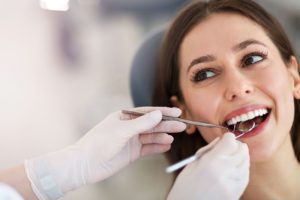We begin visiting the dentist for regular appointments as soon as we start growing our first baby teeth. But as we age, we become busier and can feel tempted to skip these routine dental appointments. However, these visits are crucial components of maintaining good oral health.
So how often do you need to attend these dentist appointments? And what occurs during them makes them so pivotal to the look and feel of our smiles? Read on to learn more about the importance of continuous preventative dental care.
What Happens During a Routine Dental Check-Up?
When you schedule a routine dental appointment, your dentist will both clean your teeth and perform an oral exam. Teeth cleaning involves scraping away plaque and tartar build-up from your smile.
Your typical teeth brushing regimen will not get rid of all residues on your teeth, especially in hard-to-reach spots like near the gumline. But lingering plaque can cause permanent structural damage to your teeth. So you need a dental expert to eradicate the areas you missed.
The oral exam will have your dentist checking your teeth and gums for early signs of dental problems like cavities and gum disease. These issues are easily treatable when diagnosed promptly.
But if allowed to progress, they can cause severe damage that may need more invasive dental work to get rid of. These efforts will allow you to save time and money by lowering your risk of a dental emergency.
How Often Should I Schedule Routine Dentist Appointments?
The average dental patient should visit their dentist for routine dental care every six months. This establishes the ideal window where the dentist can remove plaque before it causes lasting damage, and they can intervene in dental problems before they progress.
However, some patients might need to see their dentist more frequently for this preventative care. Senior-aged patients, those with a higher propensity for tartar formation, and people with underlying medical concerns may have to visit their dentist three or four times per year. Ask your dentist about what type of preventative dental plan will work best with your unique smile.
What Do I Do During a Dental Emergency?
Even with diligent preventative dentistry measures both in the dentist’s office and at home, accidents can happen. You may suffer a dental emergency such as tooth breakage in between your regularly scheduled appointments.
If you do notice a dental concern, you should not wait until this next visit to let your dentist know. Call your dentist’s office as soon as you can. Even if you do not feel pain, talk to your dental professional. You should not suffer through this discomfort.
The issue could point to a larger dental problem that may worsen in the time before your next dental check-up. So let your dentist evaluate and treat the problem in a timely fashion. Urgent dental attention can make sure you do not endure lasting damage to your smile.

